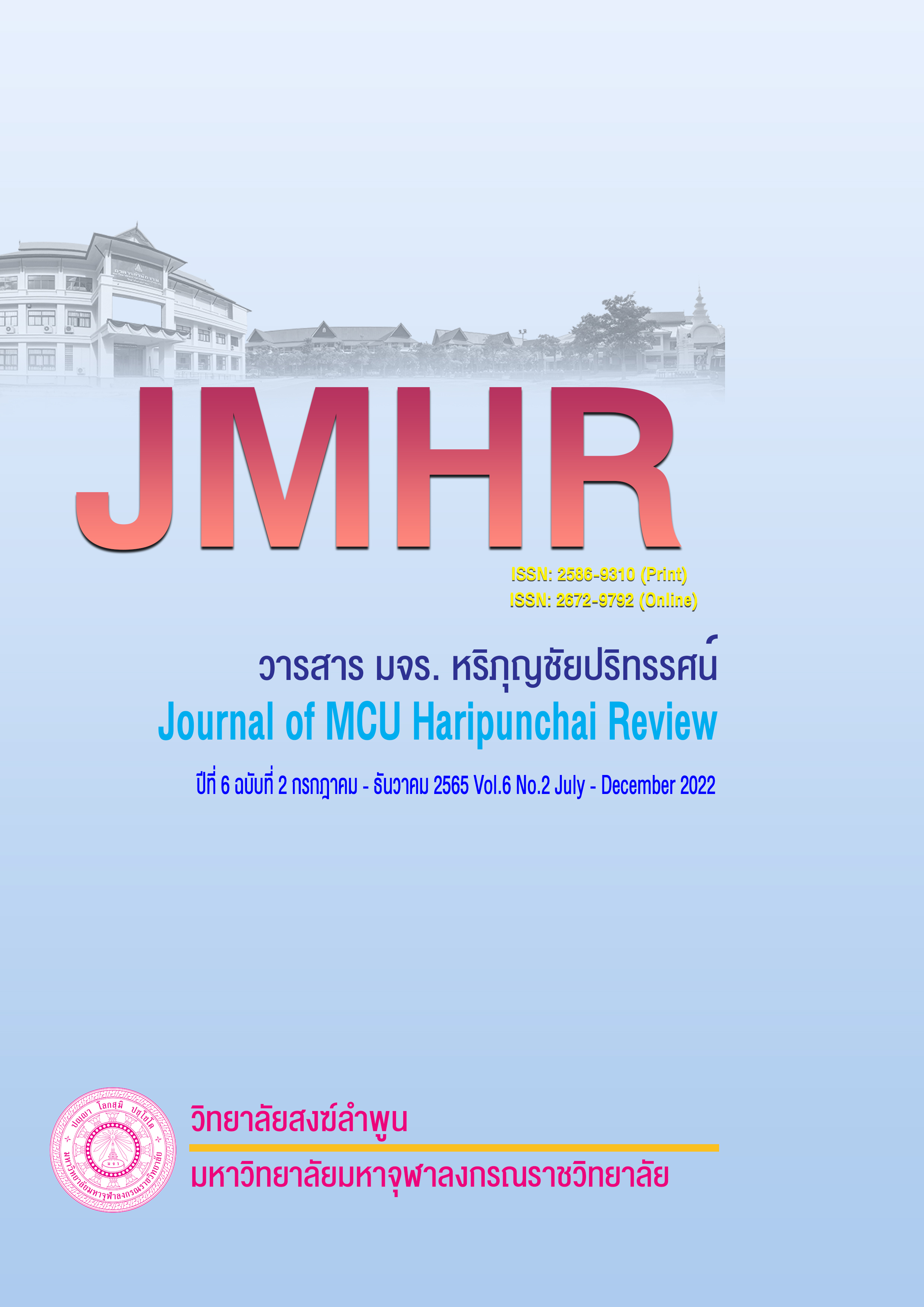Sappurisa-dhamma7 and organization's administration
Main Article Content
Abstract
Administrative decisions affect the success of the organization's administration. Because decision making is an analytical thinking process, synthesize information to make a choice, evaluate options and choose the best option to be used as a guideline or action to achieve the job objectives. The effectiveness of decision making depends on two important factors: synthetic analytical thinking skills and data or information used in analytical thinking which such information scholars call Managerial knowledge; because it is the substance that executives should know. In order to engage in the administrative functions itself and to make it easier to study; therefore, such knowledge is divided into 4 areas, namely, environment, organization, work or mission, and personnel. According to the comparative analysis of the content scope between administrative knowledge with the elements of Sappurisa-dhamma7, which are Buddhist principles for good or perfect people. It is enough to agree that there is a correlation and connection with each other in pairs. That is to say, environmental knowledge is consistent with the Parisaññutā (Knowing the community) Organizational knowledge consistent with Atthaññutā (knowing the purpose, knowing the result) Knowledge of work or mission consistent with Dhammaññutā (Knowing the principle, knowing the cause), Mattaññutā (Knowing the approximation) and Kālaññutā (Knowing the time). The personnel's knowledge corresponds to Puggalaññutā (Knowing the individual) and Attaññutā (Knowing oneself). The results of the synthesis mentioned above show the relationship and consistency between Sappurisa-dhamma 7 principles and organizational management processes. Another clear and concrete approach pointed out that executives who adhere to the principles of Sappurisa- dhamma 7, in addition to having the qualities of being a perfect person. These qualities also contribute to a successful managerial career.
Article Details

This work is licensed under a Creative Commons Attribution-NonCommercial-NoDerivatives 4.0 International License.
References
ธร สุนทรยุทธ. (มปป.) หลักการและทฤษฎีทางการบริหารการศึกษา. ภาควิชาบริหารการศึกษาคณะศึกษาศาสตร์ มหาวิทยาลัยบูรพา,
บรรยงค์ โตจินดา. (2548). องคการและการจัดการ. (พิมพ์ครั้งที่ 3). กรุงเทพมหานคร: รวมสาส์น.
พระธรรมกิตติวงศ์. (ทองดี สุรเตโช. 2548). ภาษาธรรม. กรุงเทพมหานคร: สำนักพิมพ์เลี่ยงเชียง.
พระธรรมปิฎก. (ป.อ. ปยุตโต. 2540). ภาวะผู้นำความสำคัญต่อการพัฒนาคน พัฒนาประเทศ.กรุงเทพมหานคร: ธรรมสภา.
________. (ป.อ. ปยุตโต. 2540). ธรรมนูญชีวิต พุทธจริยธรรมเพื่อชีวิตที่ดีงาม. กรุงเทพมหานคร: อัมริทรการพิมพ์.
พระมหาสมควร ศรีสงคราม. (2550). การศึกษาความสัมพันธ์ระหว่างสัปปุริสธรรมและพละธรรม กับการปฏิบัติงานของผู้บริหารสถานศึกษา กลุ่มเขตธนใต้ สังกัดกรุงเทพมหานคร. ตามหลักสูตรปริญญาการศึกษามหาบัณฑิต สาขาวิชาการบริหารการศึกษา มหาวิทยาลัยศรี- นครินทรวิโรฒ.
วันทนา เมืองจันทร์. (2544, กรกฎาคม). การปฏิรูปการศึกษา:คุณธรรมของผู้บริหารกับบทบาทในการประ กันคุณภาพการศึกษา. วิทยาจารย์. 100(4): 21-25.
สมชาย วสันตวิสุทธิ์. (2549). นิสัยที่ดีเจ็ดประการของผู้บริหาร. [ออนไลน์]. แหล่งข้อมูล : จากhttp://www.osknetwork.com/modules.php?name=News&file=article&sid=304. [30 กรกฎาคม 2565].
สมเด็จพระสังฆราช. (เจริญ สุวัฑฒโน. 2549). ธรรมศึกษา. [ออนไลน์]. แหล่งข้อมูล : http://mahamakuta.inet.co.th/study/study64/mk6412.html [30 กรกฎาคม 2565].
สมยศ นาวีการ. (2522). การบริหาร. กรุงเทพมหานคร : สำนักพิมพ์ดวงกลม, .
สมหวัง วิทยาปีญญานนท์. (2547). การบริหารด้วยหลักสัปปุริส[ออนไลน์]. แหล่งข้อมูล : http://www.budmgt.com/budman/bm01/goodman.html [30 กรกฎาคม 2565].
หวน พินธุพันธ์. (2528). การบริหารโรงเรียน. กรุงเทพมหานคร : สำนักพิมพ์โอเดียนสโตร์,
Anthony, William P. (1981). Management : Competencies and Incompetencies. California : Addison Wesley Publishing Co., Inc.
Brown, Warren B. and Moberg, Dennis J. (1980). Organization Theory and Management : A Macro Approach. New York : John Wiley and Sons.
Deep , Samuel D. (1978). Human Relations in Management. New York : Macmillan Publishing Co.
Draft, Richard L. (2000). Management. 5thed. New York : The Dryden Press.
Griffiths, D.E. (1959). Administrative theory. New York, N.Y. : Appleton-Century Crofts.
Hoy, Wayne K. and Miskel Cecil G. (1991). Educational Administration : Theory, Research and Practice. 4th ed. New York : McGraw-Hill, Inc.
Katz, Robert L. “Skills of an Effective Administrator,” (September- December 1974). Harvard Business Review.
Lunenburg, Fred C. and Ornstein, Allan C. (1991). Educational Administration : Concepts and Practices. Belmont, California : A Division of Wadsworth, Inc.
.(1960). The Science of Management Decision. New York : Harper & Row.
Pfiffner, Jahm M. and Sherwood, Frank P. (1960). Administrative Organization. Englewood Cliffs, NJ : Prentice - Hall, Inc.
Stoner, James A.F. (1985). Management. 2nd ed. New Delhi : Prentice - Hall of India,
Private Limited.
Sergiovanni, Thomas J. and Others (1987). Educational Governance and Administration. 2nd ed. Englewood Cliffs , NJ : Prentice – Hall.


